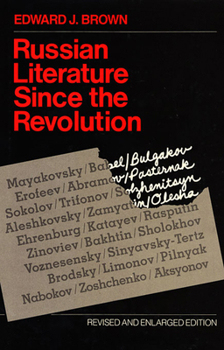Russian Literature Since the Revolution: Revised and Enlarged Edition
Select Format
Select Condition 
Book Overview
Introduction: Literature and the Political Problem
1. Since 1917: A Brief History Soviet LiteraturePersistence of the Past
Fellow Travelers
Proletarians
The Stalinists
Socialist Realism
The Thaw
The Sixties and Seventies 2. Mayakovsky and the Left Front of Art The Suicide Note
Vladimir Mayakovsky, A Tragedy
The Cloud
The Backbone Flute
The Commune and the Left Front
The Bedbug and The Bath
Mayakovsky as a Monument
Poets of Different Camps 3. Prophets of a Brave New World The Machine and England
Olesha's Critique of the Reason
Envy and Rage 4. The Intellectuals, I Serapions
Boris Pilnyak: Biology and History 5. The Intellectuals, II Isaac Babel: Horror in a Minor Key
Konstantin Fedin: The Confrontation with Europe
Leonov and Katayev
Conclusion 6. The Proletarians, I The Proletcult
The Blacksmith Poets
Yury Libedinsky: Communists as Human Beings
Tarasov-Rodionov: , Our Own Wives, Our Own Children
Dmitry Furmanov: An Earnest Commissar
A. S. Serafimovich: A Popular Saga 7. The Proletarians, II Fyodor Gladkov: A Literary Autodidact
Alexander Fadeyev: The Search for a New Leo Tolstoy
Mikhail Sholokhov: The Don Cossacks
A Scatter of Minor Deities
Conclusion 8. The Critic Voronsky and the Pereval Group Criticism and the Study of Literature
Voronsky
Pereval 9. The Levers of Control under Stalin Resistance
The Purge
The Literary State 10. Zoshchenko and the Art of Satire 11. After Stalin: The First Two Thaws Pomerantsev, Panova, and The Guests
Ilya Ehrenburg and Alexey Tolstoy
The Second Thaw
The Way of Pasternak 12. Into the Underground The Literary Parties
The Trouble with Gosizdat: End of a Thaw
Buried Treasure: Platonov and Bulgakov
The Exodus into Samizdat and Tamizdat: Sinyavsky 13. Solzhenitsyn and the Epic of the Camps One Day
The First Circle and The Cancer Ward
The Gulag
The Calf and the Oak: Dichtung and Wahrheit
Other Contributions to the Epic 14. The Surface Channel, I: The Village 15. The Surface Channel, II: Variety of Theme and Style The City: Intelligentsia, Women, Workers
The Backwoods: Ethical Problems
Other New Voices of the Sixties and Seventies
World War II
Published Poets
A Final Word on Socialist Realism 16. Exiles, Early and Late The Exile Experience
Young Prose and What Became of It
Religious Quest: Maximov and Ternovsky
Truth through Obscenity: Yuz Aleshkovsky
Transcendence and Tragedy: Erofeev's Trip
Poetry of the Daft: Sasha Sokolov
Perversion of Logic as Ideology: Alexander Zinoviev
A Gathering of Writers Conclusion Notes Selected Bibliography Index
Format:Paperback
Language:English
ISBN:0674782046
ISBN13:9780674782044
Release Date:October 1982
Publisher:Harvard University Press
Length:413 Pages
Weight:1.35 lbs.
Dimensions:1.1" x 6.1" x 9.3"
Customer Reviews
1 rating
a handbook of 20th cent. literature.
Published by Thriftbooks.com User , 18 years ago
This book slides in and out of print but can usually be found in used stores or online. It begins with Mayakovsky and ends with Alexander Zinoviev and covers the best writers, official or dissident, over a period of 65 years in the Soviet Union. Political context is the rope that ties all of these writers together from Isaac Babel's murder to Mikhail Bulgakov's silence to Andrei Sinyavsky's exile to young Eduard Limonov's poverty in America. What emerges is a picture of many of the riskiest and most experimental authors of the 20th century. For every western modernist like Proust, Joyce, Faulkner, Woolf or Pynchon, there was an equal talent in Russia, often going unnoticed. This is the conclusion I've drawn from the text and not the book's thesis. Writers in this book may be categorized as the officially published like Yuri Trifinov and Leonid Leonov or outcasts like Vasily Aksyonov and Vladimir Nabokov but all are discussed for their artistic merit and their contribution as writers of and from Russia. It's not a quick narrative read but each chapter gives an introduction to severeal different writers including many who never made a big impact in translation. In short, this book inspires the reader to go out and find other books -- great books. I've owned my copy for a decade and still refer to it when I wish to look for an author that is new to me. The only, slight fault with this book is that it ends in the 1980s, when it waqs first published, with the Soviet Union still intact. An update of writers who returned to Russia like Solzhenitsyn or Limonov would make a nice finale. So for a good book on that you have to read "The Last Years of Soviet Russian Literature" by Deming Brown, not to be confused with this book's author.





